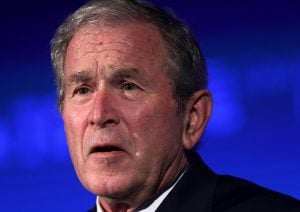
George W. Bush (Photo by Alex Wong/Getty Images)
A frequent refrain in 2017 is that one wishes that George W. Bush were still president instead of Trump (the idea being, “Trump is so bad that I miss George W. Bush!”). But to some individuals with long memories of the Bush administration, such a view defies belief. Novelist Terry Jastrow clearly has not forgotten some of the alleged sins of the Bush presidency, including the war in Iraq. In his new novel, The Trial of Prisoner 043, Jastrow imagines a fictional trial of Bush at the International Criminal Court at The Hague (the “ICC”) for war crimes. While the novel is an interesting thought experiment, it is not successful as a legal novel.
As the novel opens, former President George W. Bush is playing golf at the famed Old Course at St. Andrews in Scotland. However, to the surprise of the Secret Service agents who are supposed to be guarding him, President Bush is arrested and brought to the ICC to await trial. Bush assembles a top-notch criminal defense team that attempts to argue that the ICC does not have jurisdiction to prosecute Bush. But when that argument falls on the deaf ears of the ICC tribunal, Bush’s defense team is forced to defend Bush’s actions during his presidency, and are pitted against two dogged prosecuting attorneys — one American and one Iraqi — dead-set on seeing Bush imprisoned for his alleged crimes during the Iraq War. Numerous real-life figures — such as Richard Clarke, Tommy Franks, and Condoleezza Rice — all arrive at The Hague to testify either for or against Bush.

Decrypting Crypto, Digital Assets, And Web3
"Decrypting Crypto" is a go-to guide for understanding the technology and tools underlying Web3 and issues raised in the context of specific legal practice areas.
As a purely political or historical book, The Trial of Prisoner 043 is certainly informative. Jastrow has clearly done his research, as evidenced by the voluminous sources referenced at the end of the novel. As Jastrow explains in the Author’s Notes, he “was more an aggregator of content than a writer.” The novel contains an in-depth analysis of the facts and public statements by the Bush administration in the lead-up to the war, and also examines some of the missteps that occurred after the war began.
Make no mistake — this novel is not pro-Bush. While Jastrow makes a valiant attempt to show what Bush’s defense would be, it is clear that Jastrow is not a fan of Bush. After all, the premise of the book itself — that the ICC would risk an international quagmire to prosecute Bush for war crimes — is itself evidence that Jastrow does not believe that the Iraq War was justified.
The book is much less successful as a legal novel. Jastrow is a television producer and actor, and it is very apparent that he is not an attorney. Given the subject matter of the trial, one would assume that each examination and cross-examination would be extremely detailed and painstaking. Instead, the examinations in The Trial of Prisoner 043 are surprisingly short, going into just enough detail to educate the reader but not enough detail to be believable.
Further, the questioning by the attorneys contains too much speechifying. The attorneys on both sides frequently pontificate without asking a question, quoting President Eisenhower’s “military industrial complex” speech or the Declaration of Independence offhand without the other side objecting. The attorneys quote from numerous documents from memory without actually marking them into evidence and showing them to the witnesses. Given the gravity and complicated nature of this particular trial, there is a laughably low amount of documentary evidence.

Skills That Set Firms Apart
Legal expertise alone isn’t enough. Today’s most successful firms invest in developing the skills that drive collaboration, leadership, and business growth. Our on-demand, customizable training modules deliver practical, high-impact learning for attorneys and staff—when and where they need it.
Further, in one cross-examination, a government official witness breaks down on the stand at the mere suggestion that his negative testimony might be a result of a vendetta against Bush. This was extremely far-fetched, something that only happens in legal entertainment. These might be nitpicky criticisms, but I found the trial so unrealistic that it really detracted from the novel.
While Jastrow does his best to describe the procedure at the ICC, I think the book could have used some additional explanation of what makes the ICC different from an American court. The Trial of Prisoner 043 is hurt by the fact that earlier this year, Scott Turow released a novel, Testimony, also taking place at the ICC. While I certainly had my problems with Testimony, one of the things Turow did well was to have a point of view character who learns about the ICC at the same time as the audience. This novel could have used a similar character. To that end, Jastrow barely develops any of the attorney characters. While there are some scenes depicting strategy sessions, they are few and far between.
(Disclosure: I received a review copy of this book.)
Harry Graff is a litigation associate at a firm, but he spends days wishing that he was writing about film, television, literature, and pop culture instead of writing briefs. If there is a law-related movie, television show, book, or any other form of media that you would like Harry Graff to discuss, he can be reached at [email protected]. Be sure to follow Harry Graff on Twitter at @harrygraff19.